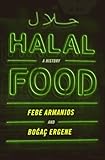Halal Food : a history / Febe Armanios and Boğaç Ergene
Material type: ArticlePublisher: Oxford : Oxford University Press, [2018]Copyright date: ©2018Description: xix, 375 pages : illustrations ; 24 cmContent type:
ArticlePublisher: Oxford : Oxford University Press, [2018]Copyright date: ©2018Description: xix, 375 pages : illustrations ; 24 cmContent type: - text
- unmediated
- volume
- 9780190269050 (hardcover)
- حلال
- BP184.9.D5 A76
| Item type | Current library | Shelving location | Call number | Copy number | Status | Date due | Barcode | |
|---|---|---|---|---|---|---|---|---|
| Halalan Thayyiban (Sinaut Campus) | Universiti Islam Sultan Sharif Ali | Sinaut Campus | SINAUT BP184.9.D5 A76 2018 c.1 (Browse shelf(Opens below)) | 1 | Available | 1050069663 |
Browsing Universiti Islam Sultan Sharif Ali shelves, Shelving location: Sinaut Campus Close shelf browser (Hides shelf browser)
| No cover image available |

|

|

|

|

|

|
||
| SINAUT BP173.75 N37 2014 c.6 Membangun ekonomi pertanian dari perspektif Islam / | SINAUT BP173.75 S26 2021 c.1 Halal marketing : concept and strategies / | SINAUT BP184.9.D5 A23 2013 c.1 Accessing the global halal market / | SINAUT BP184.9.D5 A76 2018 c.1 Halal Food : a history / | SINAUT BP184.9.D5 A95 2019 c.1 Pengurusan keselamatan industri halal menurut perspektif : maqasid al-shariáh / | SINAUT BP184.9.D5 A95 2019 c.2 Pengurusan keselamatan industri halal menurut perspektif : maqasid al-shariáh / | SINAUT BP184.9.D5 A95 2019 c.3 Pengurusan keselamatan industri halal menurut perspektif : maqasid al-shariáh / |
Includes bibliographical references (pages 331-348" and index
This book explores what halal (permissible) food means to Muslims; how its legal and cultural interpretations have changed over time and in different geographies; and how it shaped modern considerations about everything from animal slaughter and minority rights to consumption and industrial practices in the modern world. Historically, Muslims used food to define their identities in relation to co-believers and non-Muslims. Food taboos are thus key to understanding the perceptions of the self and other in multiple settings. Halal Food provides a scholarly yet accessible survey of related issues through an exploration of the Qur'an and prophetic customs, where Islamic considerations of food purity find their roots, as well as writings from various temporal and geographical settings. Traditionally, most halal interpretations focused on animal slaughter and the consumption of intoxicants. Muslims today, however, must also contend with an array of manufactured food products-yogurts, chocolates, cheeses, candies, and sodas-filled with unknown additives and fillers. To help consumers navigate the new halal marketplace, dozens of certifying agencies, government and non-government bodies, and global businesses vie to meet increased demands for food piety. At the same time, individual entrepreneurs work to mediate the halal food experience, be it through the development of blogs, cookbooks, restaurants, or social media apps, while animal rights and eco-conscious activists seek to recover halal's more wholesome and ethical inclinations. For those curious about the history of halal food and its place in the modern world, this book highlights a number of timely topics and issues
There are no comments on this title.


